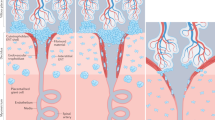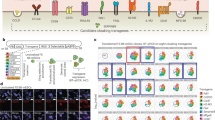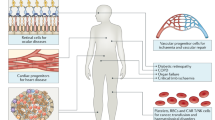Abstract
GENETICALLY different individuals will not usually accept tissue grafts from one another. The best known exception to this is the ability of the foetus to act as a homograft. Fertilised mouse eggs contain both paternally and maternally derived antigens1,2, but it has not so far been demonstrated whether paternal antigens are expressed on mouse trophoblast, the embryo tissue which forms initial contact with the maternal circulation. If present, such antigens may be masked by a mucopolysaccharide3; this has been disputed by Simmons et al.4. Alternatively, it has been proposed that trophoblast lacks transplantation antigens5 and Searle et al.6 failed to immunise a recipient with mouse trophoblast when tested either by skin grafting or cell-mediated cytotoxicity. It has been suggested, however, that histocompatibility antigens on human trophoblast were responsible for cytotoxic antibody found in the sera of 12-week human pregnancies7, and Nakakita showed antibody production in mice to human trophoblast, using immune adherence8. I now report the presence of both paternal and maternal antigens on trophoblast outgrowths of mouse blastocysts in vitro.
This is a preview of subscription content, access via your institution
Access options
Subscribe to this journal
Receive 51 print issues and online access
$199.00 per year
only $3.90 per issue
Buy this article
- Purchase on Springer Link
- Instant access to full article PDF
Prices may be subject to local taxes which are calculated during checkout
Similar content being viewed by others
References
Hakansson, S., Heyner, S., Sundqvist, K. G., and Bergstrom, S., Int. J. Fert., 20, 137–140 (1975).
Searle, R. F., Johnson, M. H., Billington, W. D., Elson, J., and Clutterbuck-Jackson, S., Transplantation, 18, 136–141 (1974).
Currie, G. A., van Dorrninck, W., and Bagshawe, K. D., Nature, 219, 191–192 (1968).
Simmons, R. L., Lipschultz, M. L., Rios, A., and Ray, P. K., Nature new Biol., 231, 111–112 (1971).
Simmons, R. L., Cruse, V., and McKay, D. G., Am. J. Obstet. Gynec., 97, 218–230 (1967).
Searle, R. F., Jenkinson, E. J., and Johnson, M. H., Nature, 255. 719–720 (1975).
van der Werf, A. J. M., Lancet, i, 595 (1971).
Nakakita, T., Nagoya Med. J., 17, 89–102 (1972).
Ansell, J. D., and Snow, M. H. L., J. Embryol. exp. Morph., 33, 43–56 (1975).
Fagraeus, A., Espmark, J. A., and Jonsson, J., Immunology, 9, 161–175 (1965).
Tachibana, T., Worst, P., and Klein, E., Immunology, 19, 809–816 (1970).
Steel, R. G. D., and Torrie, J. H., Principles and Procedures of Statistics (McGraw-Hill, New York, Toronto and London, 1960).
Nathenson, S. G., and Cullen, S. E., Biochim. biophys. Acta, 344, 1–25 (1974).
Author information
Authors and Affiliations
Rights and permissions
About this article
Cite this article
CARTER, J. Expression of maternal and paternal antigens on trophoblast. Nature 262, 292–293 (1976). https://doi.org/10.1038/262292a0
Received:
Accepted:
Published:
Issue Date:
DOI: https://doi.org/10.1038/262292a0
This article is cited by
-
Antigen expression on early mouse trophoblast
Nature (1977)
-
Possible protecting role of maternal immunoglobulins on embryonic development in mammals
Immunogenetics (1977)
Comments
By submitting a comment you agree to abide by our Terms and Community Guidelines. If you find something abusive or that does not comply with our terms or guidelines please flag it as inappropriate.



